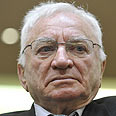
'There was no fence in the forest.' Blatt
צילום: AFP
Sobibor survivor testifies at Demjanjuk trial
82-year-old witness says not remember Demjanjuk himself from camp, but claims Ukrainian guards were instrumental in keeping prisoners from fleeing. 'Every second we were threatened with death,' he tells court
Prisoners at the Nazis' Sobibor extermination camp faced the threat of death "every second," one of the camp's few survivors testified Tuesday at the Munich trial of John Demjanjuk, who is accused of being a guard there.
Demjanjuk, an 89-year-old retired Ohio auto worker, was born in Ukraine but was deported from the US last year. He is charged with 27,900 counts of accessory to murder for his alleged activities as a guard at Sobibor, in occupied Poland, in 1943.
Witness Thomas Blatt, 82, has said he does not remember Demjanjuk himself from the camp. He told the court he "did not have a lot of contact with the watchmen."
But, he said, the Ukrainian guards were instrumental in keeping prisoners from fleeing while on work details outside the camp in occupied Poland.
"There was no fence in the forest," the white-haired Blatt told the court, alternating between broken German and accented English. "We had only the Ukrainians like Mr. Demjanjuk to keep us from fleeing."
Demjanjuk, once a Soviet Red Army soldier, is accused of agreeing to serve as a guard for the SS and training at the Nazis' Trawniki camp following his capture as a POW in 1942.
Demjanjuk rejects the charges, saying he never served as a camp guard. He faces a possible 15-year sentence if convicted.
Blatt, who has joined the trial as a co-plaintiff as allowed under German law, is one of only 66 Sobibor prisoners believed to have survived the war. His mother, father and brother were killed immediately after the family was deported to the Sobibor camp from their small town in Poland in April 1943.
'Please don't cut it so short'
Blatt was spared because he was selected to work in the camp. Blatt angrily told defense attorney Ulrich Busch, when he pressed for more specific details about the camp buildings, that he did not often have time to look around.
"I was a prisoner," he said. "Every second we were threatened with death."
Blatt used a drawing of Sobibor to explain what he did remember, pointing out various areas with a pen on an overhead projector.
The image was projected on one of the courtroom's large white walls, above the head of Demjanjuk, who lay throughout the entire testimony on a bed under a blanket, a baseball cap pulled down over his eyes.
Blatt said Polish Jews who lived near the death camp knew what awaited them but those arriving from other parts of Europe had no clue.
He pointed out a building where women prisoners were taken shortly after arriving in the camp to have their hair cut short before being sent into the gas chambers, which they were told were a disinfectant shower.
"The women from Holland, they didn't know they were going to their deaths," he recalled. "They said: 'Please don't cut it so short,' but the Poles knew. They said: "Why are you doing this?'"
The trial in Germany comes after 30 years of legal action against Demjanjuk on three continents.
Demjanjuk had his US citizenship revoked in 1981 after the Justice Department alleged he hid his past as the notorious Treblinka guard "Ivan the Terrible." He was extradited to Israel, where he was found guilty and sentenced to death in 1988, only to have the conviction overturned five years later as a case of mistaken identity.
In the latest prosecution, Demjanjuk is accused of serving as a "Wachmann" or guard, the lowest rank of the volunteers subordinate to German SS men. It is the first time a conviction has been sought against someone so low-ranking without proof of a specific offense.










